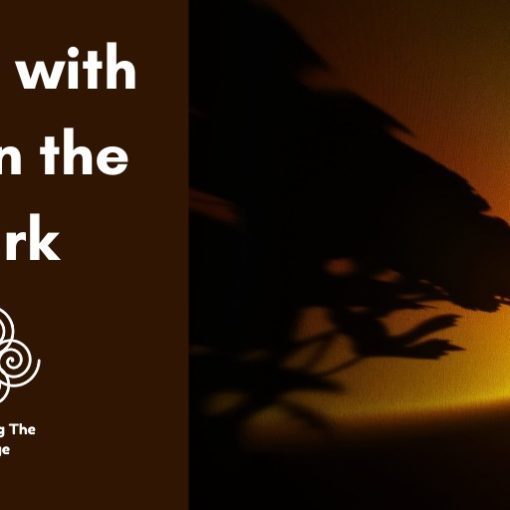We are happy to accept good from God, but what about trouble? There is something deeper available when we center on clinging to God.
As a gardener, I work in all kinds of weather. Rain, sun, and wind – both light and strong. In the extremes, I complain.
The furnace of summer heat can be too much. Then in the winter, torrents of rain can stop me in my tracks. Sometimes the wind can blow so hard it’s dangerous.
But I know all this weather has both good and bad. In the summer, I long for the rain to water the earth and wash the dust off the trees.
In the winter, I long for the sun to warm me and the earth. Lighting charges the rain with nitrogen to be part of a cycle of blessing to the earth below. The wind keeps the flow of life from being stagnant.
I walk the gardens, and my mood’s pendulum swings from thankfulness to grumbling.
Throughout this, I have to remind myself that God is good. I have an eternal God that wants to help me in this broken mixed-up world.
Can you accept both good from God and trouble?
It’s easy to accept the good. The days when everything is going well, the sun is shining, you’ve slept well, and you know you have beauty and purpose.
But what about when the clouds are dark, tiredness and pain surround the heart, and you feel ugly and defeated. You want to hide or worse.
Acceptance is something we grow ourselves into.
Shall we accept good from God and not trouble?
In this series, we are diving into one of the most mysterious and traumatic books of the Bible – Job.
Our kindred human friend sits alone on an ash heap, picking at his sores. He has just been assailed by his wife for his faithful commitment to God, and she wants him to walk away from his faith.
Job took a potsherd with which to scrape himself, and sat among the ashes.
Then his wife said to him, ‘Do you still persist in your integrity? Curse God, and die.’ Job 2:8,9
Job speaks his response.
But he said to her, “You speak as any foolish woman would speak. Shall we receive the good at the hand of God, and not receive the bad?” In all this Job did not sin with his lips. Job 2:10
We have to unpack this verse.
When he says, ‘You speak as any foolish woman would speak,’ he is saying that she doesn’t have the knowledge to make such declarations. She does not have the depth of wisdom from which to draw to help in this situation.
Then he asks a question.
Questions have a way of opening up the other to explore further. They can be challenging, but sometimes hard questions need to be asked. Questions that take us into mystery and confusion. The book of Job and Job himself is full of such questions.
Words matter.
Shall we receive into ourselves only the benefits without also the adversities?
Currently, I am pruning roses. It’s winter, and they are dormant, but I know that spring is coming, and new buds will be pushing.
I am pruning, I am being harsh, and there is adversity, but I have a compelling vision of beauty and purpose coming to greet me in four months. The trouble produces the benefits.
I, too, am a rose bush. I endue the rain, cold, drought and storms. But I also receive warmth and water, sunlight, and affirmations. Out of this mixture of blessing and adversity comes depth of knowing. A knowing that can bless others and me.

Learning to know
We want the benefits.
We still know deep within ourselves, somewhere in our DNA, of ‘walking in the cool of the day‘ with God.
Tasting perfection in all things. We still know it, but we are no longer there. We now have a mixture of the harshness of living outside the garden and the scent of beautiful roses.
Acceptance of our situation grows by going deep into knowing God rather than demanding God’s blessings and removing the adversities.
I mindfully swing my pendulum of conscious focus back into sitting at the feet of Jesus and being still and silent. I want to know God more than God’s blessings and relief from adversity.
This is what we find by the end of the Book of Job. He is brought to a more profound knowledge of God.
God wants us to be open and honest to them about all areas of our lives.
Being thankful for the benefits but also grateful that we are not alone in times of adversity.
Acceptance grows with knowing we are accepted by God no matter where the pendulum of life swings.
What are you velcro clinging to?
But what are you clinging to? What is your default focus – the benefits or the adversity?
Our brains have a habit of clinging like Velcro to negative experiences and being like Teflon to the positive.
Rick Hanson writes this.
The brain is like Velcro for negative experiences, but Teflon for positive ones.
[This] shades “implicit memory” – your underlying expectations, beliefs, action strategies, and mood – in an increasingly negative direction. Rick Hanson
I want to train my brain to velcro cling to the goodness of God. In those times of adversity, I will be held like Velcro to God’s love for me.
So to answer the question – Shall we accept good from God and not trouble? Yes, we will.
Quotes to consider
- All of life is a mixture of joy and sorrow, and we must accept both together. (But one is not a punishment or reward for the other. This is crucial.) In the mystery of Christ’s death and resurrection, this becomes very dramatized, personalized, and correctly imaged. Both come together, and we can’t have one without the other. There has been a great temptation in many modern religious movements — like some in the charismatic movement or the “gospel of success” — to have the resurrection without the cross, to enjoy part of the mystery, and to avoid the pain that necessarily goes with it. Rohr, Richard. Job and the Mystery of Suffering
- Worthwhile joy has pain stain. True joy is not authentic unless achieved through pain — not under it, not to the right or left or over, but through it. That’s the only authentic Christian joy. Any other joy is a covering up of pain, an escaping and denying. There is much denial in religion. The old ostrich maneuver — pretend it’s not happening. That’s not what the Lord is calling us to; it’s not the whole paschal mystery. Rohr, Richard. Job and the Mystery of Suffering
- Compassion means entering the suffering of another in order to lead the way out. Rosaria Champagne Butterfield
- When you stand before Me [God] in mystery, you will eventually rest within Me in trust. When you can’t figure Me out, you will give up the illusion of predictability and control and discover the joy of freedom and hope. Larry Crabb
Questions to answer
- Questions are there to open us up. How do you respond to Job’s question? Shall we accept good from God and not trouble?
- Pruning roses, extremes of weather. What picture spoke to you the most?
- The mood pendulum swings. How can we keep it centered on knowing God in both the extremes of blessing and adversity?
Further reading
From One Thousand Gifts to Three Thousand Gifts and Counting
Barry Pearman
Photo by Danie Franco on Unsplash

Barry is a writer, coach, and course creator that has a passion for empowering Mental Health through Faith, Hope, and Love.
Get two free ebooks. One about Depression and one about Spiritual Exercises that will help your Mental Health





